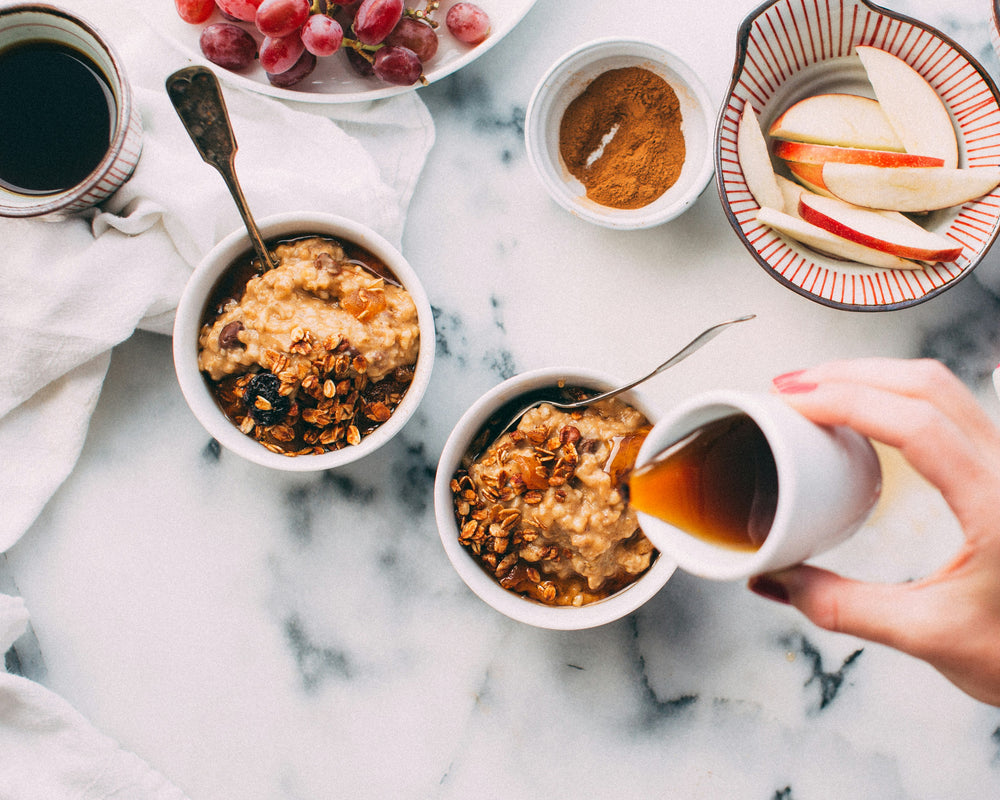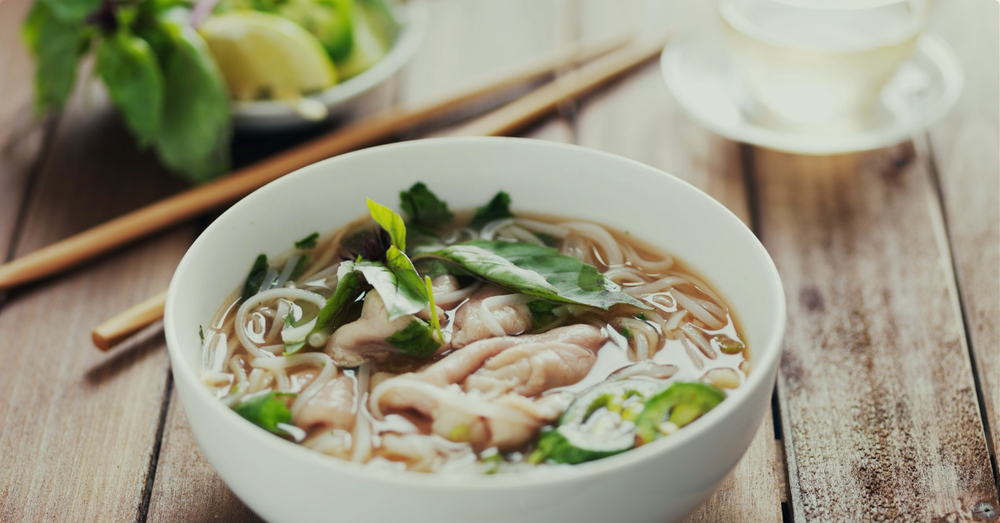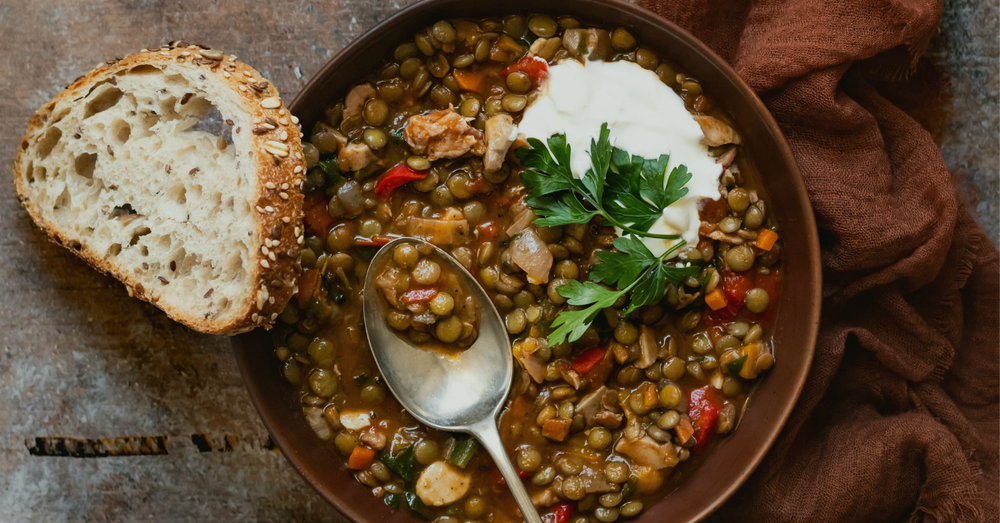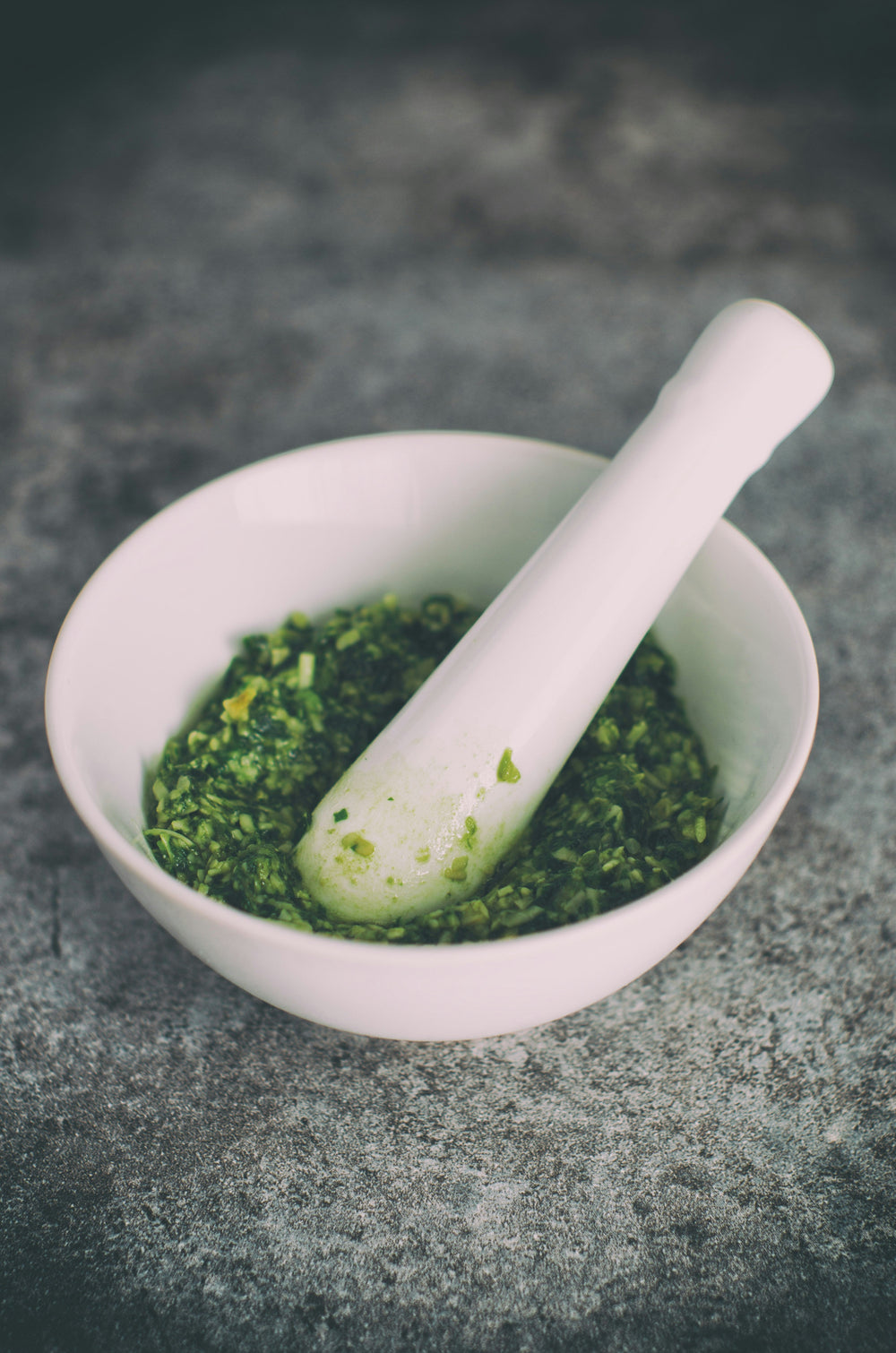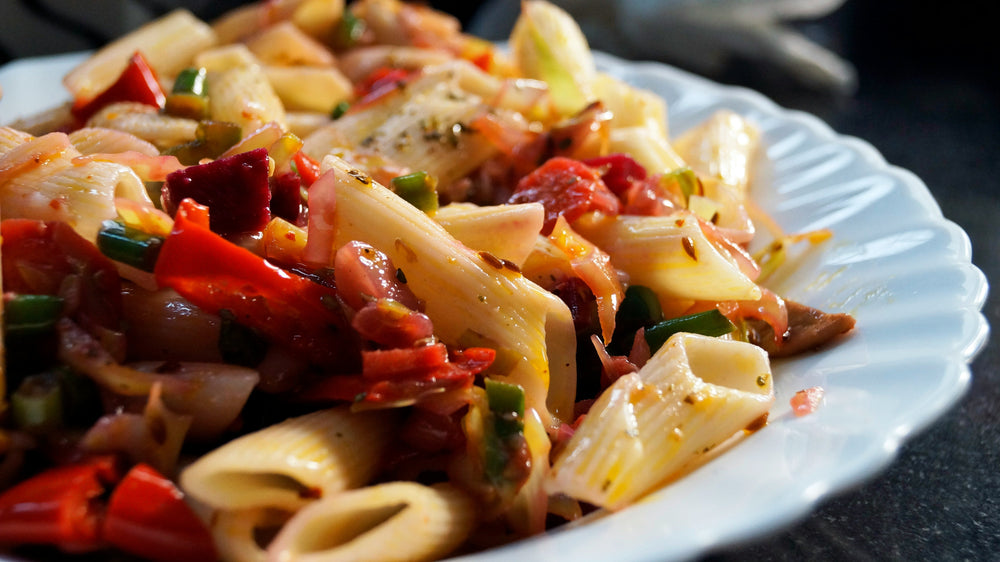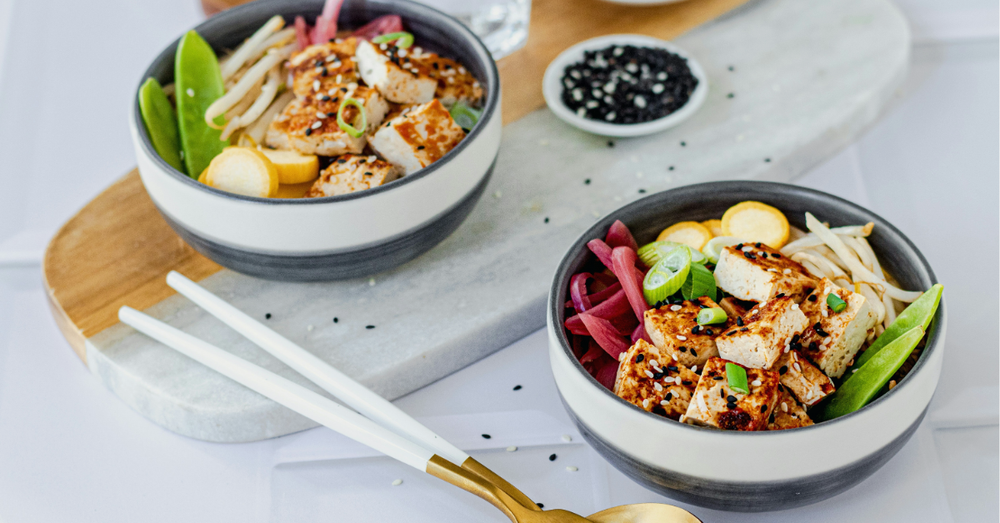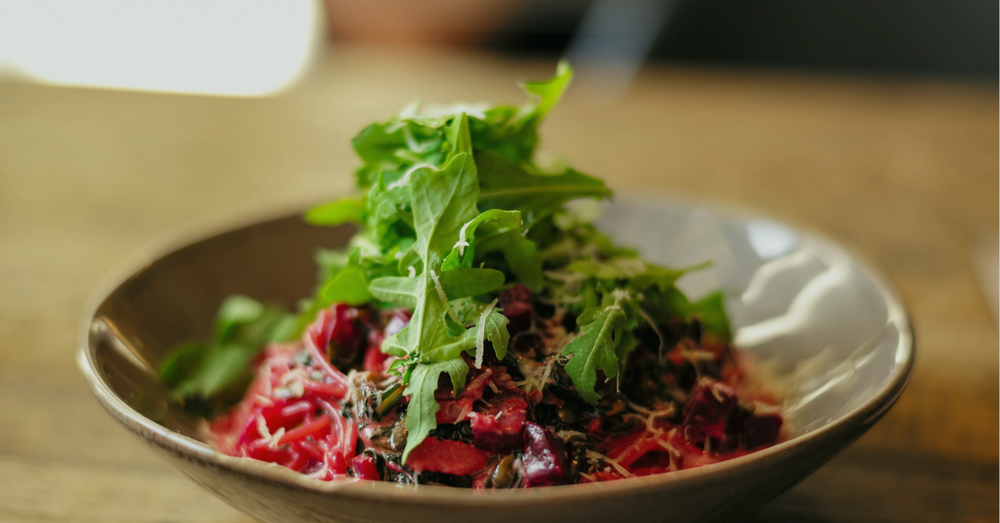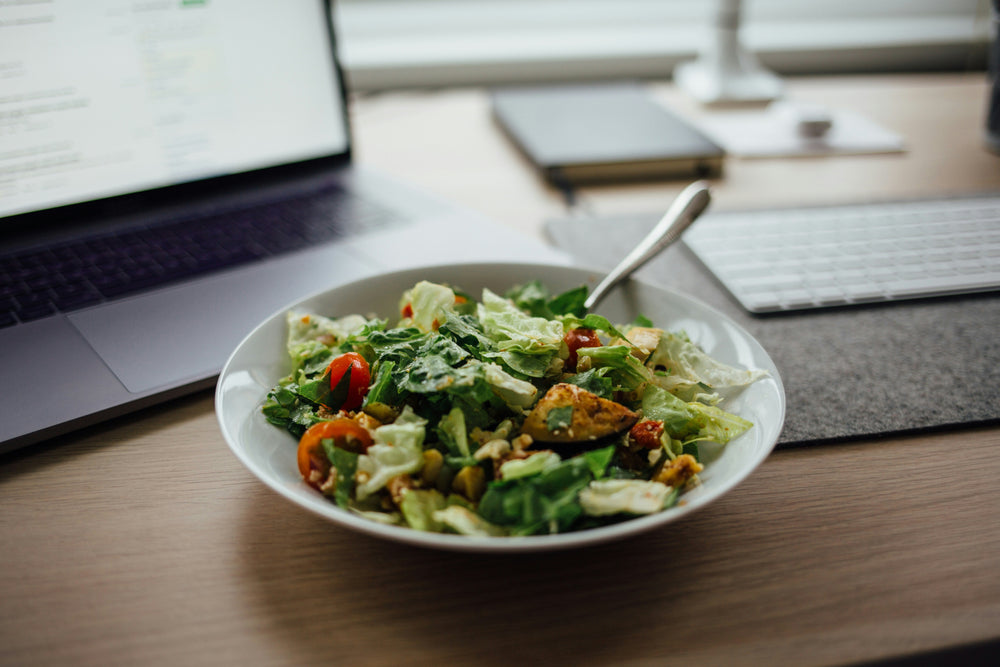This creamy green soup brings together broccoli, cauliflower, and kale for a delicious bowl that feels both comforting and energising. Finished with crispy chickpeas and toasted almonds, it is an easy way to enjoy a whole day’s worth of greens in one simple, nourishing meal.
Love and appetite - what is the link?
The Surprising Link Between Oxytocin and Appetite Control Oxytocin, also known as "the love hormone" is a neuropeptide that help send messages between the brain and different parts of the body. It's primarily known for its influence on social behaviour, reproduction, and emotional well-being. However, there is another fascinating aspect of its function: its ability to control appetite. How Does Oxytocin Influence Hunger? Oxytocin plays a key role in regulating hormones such as ghrelin and leptin. Ghrelin, known as the "hunger hormone," is released by the stomach to signal when it’s time to eat, stimulating appetite and food intake. Leptin, on the other hand, acts as the body's "appetite regulator," released by fat cells to tell the brain when there is enough energy stored in the body, promoting feelings of fullness. How Oxytocin Controls Food Intake Oxytocin doesn't just curb your appetite in one simple way. Some of the ways it works include: Controlling meal size: Oxytocin helps control portion sizes by signalling fullness, making it easier to eat smaller, more balanced meals. Food reward responses: It influences the brain’s reward system, helping to curb the urge to eat in response to stress or emotions rather than hunger. Curb sugar cravings: Oxytocin may reduce cravings for sweet foods by regulating dopamine, the "feel-good" hormone, and influencing brain areas that control pleasure and reward. The Gut-Brain Connection Research suggests that gut microbes communicate with the brain through the vagus nerve, playing a role in oxytocin production and release. An imbalance between good and unwanted gut bacteria, known as dysbiosis, can directly affect how oxytocin is produced and released in the body. How to Boost Oxytocin Oxytocin is released when we experience positive interactions, whether it’s with other people or even animals. A simple touch, a warm hug, or stroking someone’s arm...

The Surprising Link Between Oxytocin and Appetite Control
Oxytocin, also known as "the love hormone" is a neuropeptide that help send messages between the brain and different parts of the body. It's primarily known for its influence on social behaviour, reproduction, and emotional well-being. However, there is another fascinating aspect of its function: its ability to control appetite.
How Does Oxytocin Influence Hunger?
Oxytocin plays a key role in regulating hormones such as ghrelin and leptin. Ghrelin, known as the "hunger hormone," is released by the stomach to signal when it’s time to eat, stimulating appetite and food intake. Leptin, on the other hand, acts as the body's "appetite regulator," released by fat cells to tell the brain when there is enough energy stored in the body, promoting feelings of fullness.
How Oxytocin Controls Food Intake
Oxytocin doesn't just curb your appetite in one simple way. Some of the ways it works include:
-
Controlling meal size: Oxytocin helps control portion sizes by signalling fullness, making it easier to eat smaller, more balanced meals.
-
Food reward responses: It influences the brain’s reward system, helping to curb the urge to eat in response to stress or emotions rather than hunger.
-
Curb sugar cravings: Oxytocin may reduce cravings for sweet foods by regulating dopamine, the "feel-good" hormone, and influencing brain areas that control pleasure and reward.

The Gut-Brain Connection
Research suggests that gut microbes communicate with the brain through the vagus nerve, playing a role in oxytocin production and release. An imbalance between good and unwanted gut bacteria, known as dysbiosis, can directly affect how oxytocin is produced and released in the body.
How to Boost Oxytocin
Oxytocin is released when we experience positive interactions, whether it’s with other people or even animals. A simple touch, a warm hug, or stroking someone’s arm can all trigger the "love" hormone. It’s also released when we eat, showing just how connected our emotions and appetite really are. This hormone plays a big role in our overall well-being, so find some time each day to feel connected with a loved one, play with your pets or do something that makes you calm. Not only does oxytocin help us feel good, but it also plays an important role in making better choices, especially when it comes to managing stress and sugary cravings.
Conclusion
Oxytocin isn’t just the “love hormone” - it also plays a key role in appetite regulation. By helping you feel full during meals and influencing how your brain responds to food, it’s an important piece of the puzzle in understanding hunger and satiety.
So next time you finish a meal feeling satisfied, you might have oxytocin to thank!
References
Kerem, L., & Lawson, E. A. (2021). The effects of oxytocin on appetite regulation, food intake and metabolism in humans. International Journal of Molecular Sciences, 22(14), 7737. https://doi.org/10.3390/ijms22147737
Liu, C. M., Spaulding, M. O., Rea, J. J., Noble, E. E., & Kanoski, S. E. (2021). Oxytocin and food intake control: Neural, behavioural, and signaling mechanisms. International Journal of Molecular Sciences, 22(19), 10859. https://doi.org/10.3390/ijms221910859
Onaka, T., & Takayanagi, Y. (2019). Role of oxytocin in the control of stress and food intake. Journal of Neuroendocrinology, 31(3), e12700. https://doi.org/10.1111/jne.12700. PMCID: PMC7217012, PMID: 30786104.
Uvnäs-Moberg, K., Handlin, L., & Petersson, M. (2015). Self-soothing behaviors with particular reference to oxytocin release induced by non-noxious sensory stimulation. Frontiers in Psychology, 5, Article 1529. https://doi.org/10.3389/fpsyg.2014.01529
lifestyle. gut health recipes.
ready in 10 minutes
herb-whipped cottage cheese chicken bagels.
These basil whipped cottage cheese protein bagels make a fresh, high-protein breakfast or lunch, combining creamy herb-blended cottage cheese with juicy chicken, rocket, and tomatoes. They’re quick to assemble, packed with flavour, and perfect for a nourishing breakfast or light lunch.
ready in 10 minutes
kiwi chocolate protein chia pots.
These Kiwi Chocolate Protein Chia Pots make an ideal high-fibre, high-protein breakfast that keeps you full and energised all morning. They’re quick to prepare, easy to store, and perfect for a healthy grab-and-go option.
ready in 15 minutes
spiced apple porridge.
This spiced apple and pumpkin seed porridge is a warming, high-fibre breakfast that’s perfect for cosy mornings. Made with creamy oats, gently caramelised apples and a crunchy pumpkin seed topping, it’s ready in just 15 minutes and serves one.
ready in 50 minutes
prep-ahead baked blueberry oats.
These prep-ahead oven-baked oats with blueberries and bananas are rich in protein and fibre, making them a nourishing, gut-friendly breakfast to enjoy all week.
ready in 15 minutes
spicy green eggs with feta.
These spicy green eggs with feta are a quick, protein-rich recipe packed with gut-friendly ingredients like spinach, courgette, and spring onion. Baked in the oven or air fryer, they’re simple to make, full of flavour, and support digestion with a balance of fibre, protein, and healthy fats. Perfect for breakfast, brunch, or a light meal, this vibrant dish proves that nourishing your gut can be both delicious and easy.
ready in 10 minutes
egg wrap with pesto.
Bright, fresh, and ready in just 10 minutes, this flavour-packed wrap serves one and is ideal for breakfast, lunch, or any time you’re after something simple yet filling.
ready in 10 minutes
peach cobbler overnight oats.
Start your day with a gut-friendly twist on a classic dessert. The peach cobbler overnight oats serve 2–3 and takes just 10 minutes to prepare the night before. Packed with fibre, flavour and feel-good ingredients, it’s the perfect make-ahead option for busy mornings or a nourishing snack you can enjoy any time of day.
ready in 15 minutes
smoky egg salad bagel crunch.
This smoky harissa egg bagel is the perfect 15-minute meal. Made with creamy Greek yoghurt, tangy pickles, and a hint of spice, it’s a high-protein twist on classic egg salad that delivers on both taste and texture. Ideal for busy days, this easy bagel recipe makes lunch feel gourmet without the effort.
ready in 20 minutes
chewy breakfast matcha protein cookies.
Soft, satisfying, and subtly sweet—these breakfast cookies are made to fuel your morning the right way. With fibre-rich oats, plant-based protein, and antioxidant-packed matcha, they’re a gut-friendly grab-and-go option that doesn’t compromise on flavour or function.
ready in 15 minutes
lemon & poppy seed pancakes.
Emily's light, gut-friendly crêpes are the perfect balance of fibre, protein, and healthy fats to support digestion and keep you feeling great.
ready in 10 minutes
carrot cake breakfast oats.
Start your day with a delicious and nutritious breakfast option - Carrot Cake Oats. Filled with fibre diversity to promote healthy digestion.












